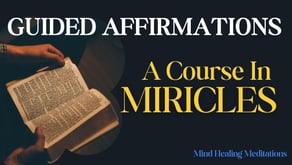The Inner Compass
Common Questions for Discerning Between Thoughts That Come from Fear and Thoughts That Come from Love


Wanderer Above the Sea of Fog” by Caspar David Friedrich
Q: Why is it so hard to tell whether a thought is coming from fear or from love?
A: Most of us live with so much mental noise, ego-driven narratives, and subtle self-deception that we're not even aware of how influenced we are by fear-based thinking. Fear shows up in spiritual disguise—dressed up as practicality, responsibility, righteousness, even love itself. To discern clearly, we first have to admit that our inner receiver is distorted. It's like trying to view a landscape through wavy, fogged-up glass. The voice of love is always available, but we've layered so many beliefs and defenses over it that the messages get garbled or overridden.
Q: What are the general signs that a thought is coming from fear?
A: Fear-based thoughts tend to be urgent, reactive, defensive, and self-focused. They feel tight. They often play out mental scenarios or justifications, and they usually aim to preserve your self-image or avoid discomfort. Fear can mimic logic, but it has a subtle emotional charge—there's a clenching underneath it. Even when it sounds wise or responsible, it tends to isolate, control, or attack.
Q: And what does a love-based thought feel like?
A: It's quieter but clearer. There's a deep internal "rightness" to it, a ring of truth that doesn't shout but resounds. It often brings an unexpected idea that shifts your perspective, includes others, and resolves more than just the immediate problem. It feels peaceful—even if it's challenging. The ego might protest it, but something in you knows it's true. It has a tone of calm authority, not defensiveness or superiority.
Q: Is there a way to practically test whether guidance is real or egoic?
A: Yes. There are many characteristics that can help:
Real guidance stretches you, rather than flatters you.
It brings peace, even if it challenges you.
It often suggests options you hadn't considered.
It takes everyone's needs into account, not just yours.
It doesn't contradict your highest values.
It feels like it came from somewhere beyond your usual thinking.
And perhaps most importantly: It won't jeopardize anyone. If a thought justifies harm, deceit, exclusion, or superiority, it's not from love.
Q: What if I receive something that feels true but also threatens my comfort?
A: That's often a sign it is true. Love's plan is independent of your personal desires. You wouldn't have come up with it, which is why it feels like it came "out of left field." Real guidance isn't about confirming your plans. It's about lifting you into alignment with the larger plan for your healing. If something feels threatening but deeply right—it's worth paying close attention.
Q: What are the biggest blocks to receiving love-based guidance?
A: Egoic attachments. Our agendas, emotional investments, and personal biases are like static that blocks the signal. Before asking for guidance, it's essential to examine these attachments honestly and be willing to set them aside. Guidance can't get through when we're clinging to a preferred outcome or secretly asking for confirmation instead of truth.
Q: How can I make space to receive true guidance?
A: Some key steps include:
Waiting in silent expectancy.
Asking with confidence.
Repeating the question to maintain focus.
Returning your mind when it wanders.
Listening not just for words, but for inner conviction or images.
Some people hear words, others just sense an inner knowing. The form doesn't matter. What matters is the willingness to be still and to trust that you are being answered.
Q: Is it possible to mishear guidance?
A: Absolutely. This is where humility matters. Just because something "feels" right doesn't mean it's from love. Always check:
Did the guidance challenge your ego?
Did it include others in a loving way?
Did it feel fresh and inspired?
Did it feel grounded in wisdom, not fantasy?
Real guidance often feels like something you couldn't have generated on your own.
Q: What do I do if I'm not sure whether what I heard was true?
A: Be tentative. If guidance feels uncertain, wait. Don't lock yourself into action based on a shaky impression. The truth is steady. If something is truly from love, it won't disappear under further reflection—it will become clearer. And if it was ego, time will usually reveal that too. The ego often burns bright and fast but fades quickly. Real guidance endures.
Q: Can I ask others for help with discernment?
A: Yes—but with care. If someone has a strong track record of receiving guidance, they can help. But it's vital that your own asking becomes holy. The real prayer is for your own mind to become clear, not for someone else to substitute theirs for yours. Group discernment can also help. When several people independently receive similar guidance, that's often a sign of authenticity.
Q: What if I act on the wrong guidance?
A: Love can work with anything. Even mistakes are included in the larger plan. What matters most is your intent and willingness to grow. As long as your heart is open and your motive is love, even wrong turns become part of the learning. Guidance exists not to perfect form, but to heal perception. It's always leading you home, not just helping you avoid errors.
Q: Should I try to get guidance on every little thing?
A: No need. Focus on the big things—the ones that affect your path, your healing, your relationships. Don't obsess over micromanaging your day. But let guidance train you over time to listen more and more. Think of it like developing a relationship. You start with big conversations and slowly learn to walk together moment by moment.
Q: Is there a best method to receive guidance?
A: It depends on you. Some people hear an inner voice. Others receive pictures, dreams, sudden insights, or simply a subtle knowing. The key is finding your most reliable channel and refining it. Practice is essential. Keep a journal. Track your guidance. Watch how it plays out. Patterns will emerge that help you trust more deeply over time.
Q: How do I stay aligned with love if I've already received guidance?
A: Trust the essence more than the details. The specifics may unfold differently than expected, but the core truth remains. Be open to adjustments, but don't abandon the original clarity unless it's clearly been replaced by something deeper. Love-based guidance holds steady, even if the outer form shifts.
Q: How do I know if I'm following fear or love, in the end?
A: Ask yourself: Is this thought making me feel more separate or more connected? More defended or more open? More reactive or more peaceful?
Fear contracts. Love expands. Fear isolates. Love includes. If the thought brings relief, tenderness, peace, or a deep sense of "yes," you're likely hearing the voice of truth.
Even if it's just once—if you've ever received real guidance, you know what it feels like. Treasure it. Remember it. Return to it. That's the compass.






